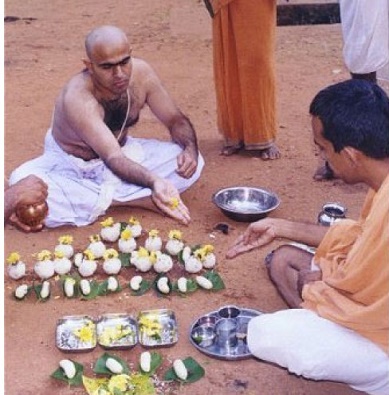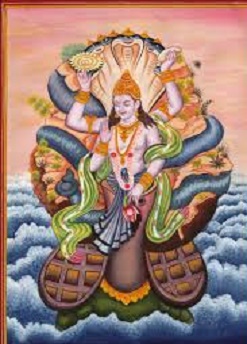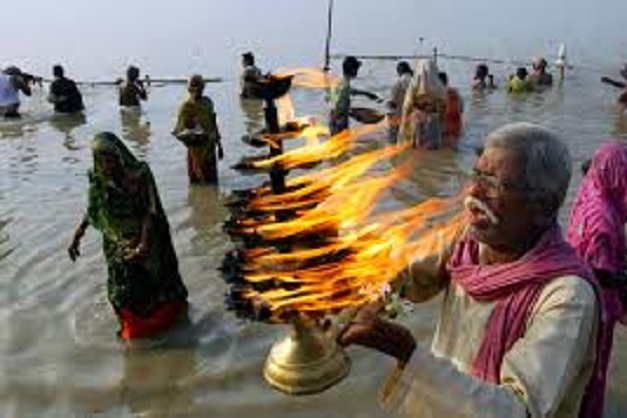Last Sunday afternoon, I caressed, massaged, and washed the cracked feet of a man who was born in 1860.
I washed his feet, and that of his son’s, and that of his son’s son, my father.
I washed their feet, sprinkled the water on my head, and after they ate their lunch, asked them, in Samskritam, if they were content. They said they were.
The priest conducting the ceremonies gave me the right perspective. “O Grandfather, and Great-Grandfather,” I was saying to them in the ceremony, “your child, my father, whom you shared with me, is now being returned to you. Please accept him in your lap.”
As my father did with me, in this life.
As I do now with my son, in this life.
The Brahmanas whose feet I washed in the ceremony were of course not “really” my father, grandfather or great-grandfather. But in their simplicity I found it easy to believe they were, and expressed silently as much love as I could as if they had “really” been sitting there before me accepting my prayers.
 And with those thoughts, I completed the strangest year of my life so far, spent in the company of three names, of which I knew only two all these years, and those three round balls of rice and ghee and sesame, that have fed fishes, ducks, cows, and unknown life-forms each month in four cities on both sides of the earth till now.
And with those thoughts, I completed the strangest year of my life so far, spent in the company of three names, of which I knew only two all these years, and those three round balls of rice and ghee and sesame, that have fed fishes, ducks, cows, and unknown life-forms each month in four cities on both sides of the earth till now.
And with these feelings of utter and helpless gratitude, I could imagine, even in the inevitable austerity and filthy edges of the temple room, the celestial grandeur of a vision, a culture, that has taken the preservation of love and gratitude in human life and daily living as a monumental project of civilization that this stupid, selfish and superficial world of today can barely even scratch the surface of.
Pitr, Pitamaha, Prapitamaha.
Ramana Rao, Krishna Rao, Ramanayya.
One hundred and fifty five years invoked, each month, on my knees, in my words, in my heart, for a glimpse of the truth that is forever.
Rituals, Cosmos and Connections
From childhood till last year, I feared the loss of my parents and elders. I avoided looking at funeral processions, and the many graveyards of Hyderabad, and even TV news bulletins that showed dead bodies. For me, death was not a triviality. It was something I would guard my senses from, until the inevitable happened at least.
When my father passed away in November last year, it marked the end of a long and strange exile of sorts for me. A disastrous situation had unfolded in my family in the months and years before his passing, and when news of his passing came to me, it seemed like the end of everything I had known, and the beginning of a numbness from which there would be no return.
But in just a few days, as the cold water baths and mud baths, and Hanuman-poses and sesame-pours, and other intricate gestures of ceremony and worship immersed me in their logic, I found myself humbled and over-awed by this world of rituals I had avoided thinking about all my life. With each gesture and action, and especially those that the priest explained, I found myself overwhelmed with feelings of love for my father, and for this world that he brought me into.
Most of our lives, we rarely feel what a blessing it is to be born. In these ceremonies, in this time of loss and sorrow, somehow, that is what I felt, again and again. I cannot presume to explain what these ceremonies mean, as I am not an expert in the scriptures.
But as a human being, a son, a father, and someone who thinks about the world with the training of a social scientist, I cannot withhold my admiration for it, and my admonition to ourselves for not taking the symbols and practices of this world seriously in the face of an alarming worldwide assault on civilization of the sort we see in our little lives and ceremonies every day.
The trouble, or limitation, of our approach to “rituals” today is that we are equipped neither to participate deeply in them, nor to even appreciate them. At best, we are told that they are “compulsory,” or that if we don’t do them something bad will happen.
There is also the aspect of ritual and ceremony as conspicuous consumption and showmanship, and of course, mercenary negotiations brought out by guilt, if not remorse. In the first few days of shock after my father’s death, I was even told by a sharp-tongued aunt that relatives would “spit” on me if I failed to perform the ceremonies. I asked where these relatives, including her, were with their judgmental spit-mouths, in the months before when I had vainly sought their help in “intervening” in a family crisis that eventually took my father’s life.
But the anger and bitterness was all then, momentary, and passed. For one whole year, as I prepared each month for the ceremonies, and learned a little bit more, I went through a range of emotions; gratitude, awe, and sometimes, still, wistful regret for his untimely absence.
What I remember most from this blur of intense ceremonies really is this. Whatever the profound philosophical import of everything we do in them, at its core, we are being asked to remember who we are in a way that we rarely do in everyday life.
In everyday life, our actions revolve around habits, desires, moods, and routines related to work, family, and pleasure. We are but bodies and egos, mostly. But in the intensity of these ceremonies, what we remember is that most primal and basic of realities. Without our gadgets, comforts, and routines, we are basically what we might have been thousands of years ago; god-worshipping people wrapped in some simple cloth, sitting cross-legged, or Hanuman style, recognizing that we are but food, Aham annam! Aham annam! And we are but the outcome of the food ingested by our ancestors.
After the ceremonies, you will not be you, but three generations of you, one and a half centuries of history that is now in you.
Marxism and Endless War
As someone who studies media and popular narratives, I can see how much more significant a “narrative” about the self-rooted in such a powerful bio-cosmology can be in anchoring us in a worldview responsive to the world around us than the narratives offered to us by media, consumerism and other modern sources of culture.
For several decades now, we have produced children from our schools who learn facts about the world that are at best useful tools for getting into college and getting jobs, but are ultimately left to fend for themselves as far as a deep “spiritual” education goes (even if that “spirituality” is really about understanding our material world accurately). Beyond that, we do not know who we are, and worse, we do not know how to experience who we are, in the limited idioms of our modern curriculum and media diet.
 Marxist theories of ideology and false consciousness are useful in recognizing the role that cultures play in limiting the imagination and preventing people from understanding themselves accurately.
Marxist theories of ideology and false consciousness are useful in recognizing the role that cultures play in limiting the imagination and preventing people from understanding themselves accurately.
Marxism, of course, prescribes its own version of “correct understanding” that is debatable, to say it politely. But what we find happening with the narrative given to us by colonial modernity, and post-colonial global consumer culture, is no different from that role. By distracting us from who we are, from our fundamental biological realties and relational-spiritual imperatives of love and kindness, our modern culture serves to distract us from the reality of the fact that we, as a civilization, are in fundamentally in a state of endless war.
This distraction from recognizing one’s self as being in a state of war, in my view, is especially pronounced and widespread in India today. On the contrary, to speak of such a thing in India is particularly dangerous. At least in America, where I teach, or at least in the liberal arts curriculum, one recognizes the validity of speaking of this modern “civilization” as a form of endless war, against nature, the poor, and so on. But in India, such a phrase runs the risk of falling into the bad books of the intolerance police: there was no war against India for 1,000 years, they will cry! Why, there was never even such a thing called India!
But their absurdities are not my concern here. My concern, remembered every month for a year, over the memory of the man who gave me not just my life but every drop of strength and love to want to live up to the gift of it, is about recognizing this state of endless war in a way that is true to our culture and civilization’s sense of the world.
At one level, in the context of history debates, it is about a 1000 years of colonization and barbarism, and it needs to be addressed fairly and accurately, without hatred for anyone in the present.
But at a deeper level it is also about going beyond, seeing it as a mere inter-civilizational or inter-religious rivalry. We have to see, ultimately, that every little gesture, thought, and belief we live out and live by are filled with the awareness that there is, at this, very moment, a massive, organized, global system of violence against nature in this world that is not natural, inevitable, and simply just the “way it is.”
We may not be able to change every bit of it overnight, such as our dependence on “resources” such as energy and food based on enormous violence against the planet and its living beings.
The War is at India’s Doorstep
But we can change our seeping laziness and complacency when it comes to a more obvious system of violence that has institutionalized itself, entrenched itself, and armed itself deeply with weapons and propaganda to destroy our sense of respect for a way of life profoundly different from theirs, a way of life deeply rooted in the love, kindness and gratitude of the everyday.
To put it more sharply: can we really afford to think that a millennium old project backed by powerful and wealthy actors to wipe out our simple and soulful customs of harmony with nature, life, ancestors and progeny are not a threat to civilization?
Can we really go around deluding ourselves that it is somehow “intolerant” or “Hindutva” of us if we call out the plain truth that the “neighborhood rivalry” in South Asia is not some simple morally equivalent one but one of permanent, institutionalized annihilation aimed at our sense of civilization, our freedom, our desire to love and live in peace with ourselves and nature?
At least in the Cold War, the nuclear madness was visible enough to earn any acronym like “MAD.” The truth is that India faces a condition of relentless assured destruction that only Indians seem too deluded to recognize fully.
Whether this destructiveness is different from what came at us before is just a debating point.
But in India, all those who cherish and believe in the brilliance of a way of life that somehow survived centuries of a systematic program for its extermination, cannot be complacent about the world that is coming, the world that is already at our doorsteps now – this time, not as a Portuguese fleet with cannons and flea-bitten thugs in it, but as the sudden and violent erasure of value and meaning from inside the minds and hearts of our own children, our reason for living, our future, and hope.
I am not saying we have to dump some ossified customs on them, or order them into blind obedience. That ship sailed, even at the time my generation was young. I don’t see the millennial or post-millennial generations being ordered around, or even being remotely convinced by our arguments about religion, tradition and the like. They are already liberal, progressive, secular, and multicultural—and that is wonderful. They are already in tune with the best sentiments of Hinduism. The fear of course, is that they don’t see the connection between liberalism, tolerance, and diversity and their own millennia-old culture that invented it even at a time other “civilizations” were “sacrificing” themselves and each other.
What will it take to make them see?
Closing Notes
The general answer, easier to say than to live by, is practice.
Practice of kindness, love, balance, happiness, generosity, fairness, honesty, and all the good things we tell them our gods and rishis taught us. It has to happen constantly, and it is not impossible, since our children help teach us as much as our parents once did too.
We, as parents, teachers, writers, elders, friends, guides, must have the clarity that we cannot take the safety of the future for granted. We might help preserve culture to some extent with temples, scholarship and the like, but we must also help preserve the faith our children have to take into the future that it is their culture, philosophy and tradition that will somehow inform them with the deepest sense of meaning and value about their lives they will ever find.
We must fill them with the sort of love that can help them win against a system of cheap hate and war, whether it really comes to our doorstep again in the form of physical violence, or just stays here in the form it has already acquired, as ideology and argument in our schools and media.
 We are a civilization that survived because like the Kurma (Tortoise) Avatara, we withdrew quietly into our shell and kept our temples, customs and gods alive to ride out storm after storm, stoning after stoning.
We are a civilization that survived because like the Kurma (Tortoise) Avatara, we withdrew quietly into our shell and kept our temples, customs and gods alive to ride out storm after storm, stoning after stoning.
Now that we have stuck our necks out and found this new world curious and inviting, we should not make the mistake of casting our shell off, or throwing stones at what has sheltered us and kept us from being viciously devoured all this time.
This nonsense that is couched as TV panel debates, this newsprint-waste, this giant toxic wave of falsehood and hidden bloodshed that inundates our senses today will not go away soon, but it will not outlast us either. For in the end, we see our world simply: we begin with some names written in a bed of rice grains, and then, we begin again, by remembering our ancestors in a handful of rice balls. We are centered, we are balanced, and we are in life, forever.
So let no lamp we light, temple bell we ring, elders’ feet we wash, ever forget who we are. And let what we do in our ceremonies be for more than jobs and pass certificates and academic and other eminences.
Let what we do, every little thing, be only for the preservation of civilization, for life itself, in this unending war we don’t even see around us anymore thanks to decades of pervasive and systematic propaganda.
Dr. Vamsee Krishna Juluri is a professor of media studies at the University of San Francisco and the author of Rearming Hinduism (www.rearming hinduism.com).

